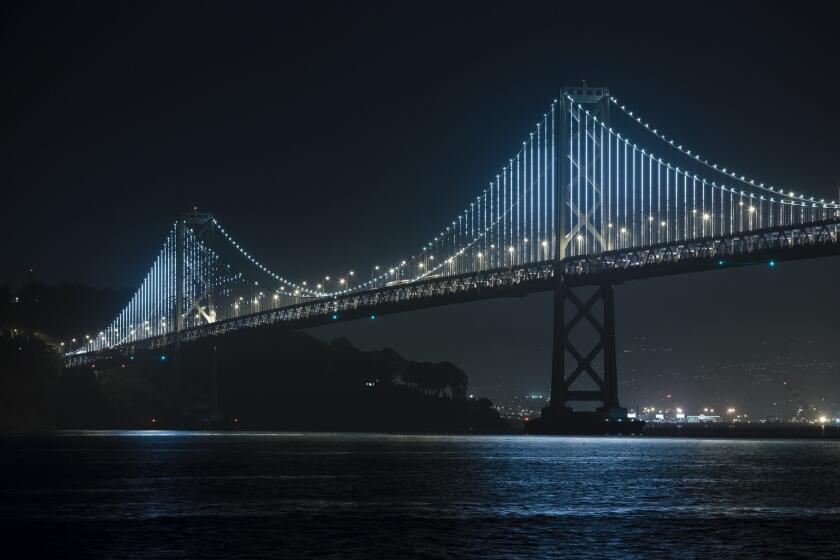The Challenge of Holding the City Together
As incomprehensible as the verdict was, it’s now history and Los Angeles has to live with it.
Live with the judgment of white suburbanites on a Ventura County jury who can return to their neighborhoods while L.A.’s leaders and residents try to hold their city together.
Thanks, Simi Valley, thanks for your judgment in the Rodney King beating case.
So now, as incoming Police Chief Willie L. Williams said, “the real challenge is for the people of Los Angeles . . . to go on from there.”
Much of the responsibility will fall on L.A.’s creaking political system and its politicians, already overwhelmed with racial and economic class divisions. The verdict will no doubt exacerbate these tensions.
To the African-American community, it comes as further confirmation of a growing feeling of political and economic powerlessness and exploitation felt by the poorest and the affluent.
I saw evidence of that Sunday at the First African Methodist Episcopal Church, where the Rev. Cecil L. (Chip) Murray ministers to a congregation that includes some of L.A.’s most influential black citizens. The congregants applauded and nodded in agreement when he talked about powerlessness:
“We take $100 on Friday night, with our eyes wide open, and give it to a hotel where we don’t even work. We take $150 shopping for a family of four with our eyes wide open and we give it to where there is not one of us on the board of directors. We drink 60% of the Scotch whiskey in this country and we don’t own one distillery. All we own is some bad breath and some red eyes from drinking it.”
In that sense, economic conditions have not improved much since the Watts insurrection.
The political results of the city’s changing demographics add to the African-Americans’ sense of powerlessness. Once solidly African-American, South Los Angeles is now heavily Latino. African-Americans fear loss of political power when new City Council districts are being drawn to reflect the city’s fast-growing Latino and Asian-American populations.
And, with no star African-American political performer waiting in the wings, blacks are all but certain to lose the mayor’s office when Tom Bradley leaves--although he has said nothing about his intentions.
Black leaders fear that this will result in policy changes harmful to their community.
For example, the Bradley-dominated Community Redevelopment Agency helps finance low-cost housing projects built by the First AME church and other black South L.A. churches. Will that continue when Bradley’s no longer in City Hall?
The council and future mayors will have to decide that. And they’ll also have to allocate resources to Latinos, founders of the city who are reclaiming the power denied them more than a century ago. The Asian-Americans, California’s fastest-growing minority, also want a share.
At this point, an Anglo reader might ask: “What about us?”
A good question, and it is part of the political equation. Actually, even though Anglos are now a minority in a city of minorities, they have more clout than any other group. That’s because the electorate--as opposed to the total population--is predominantly Anglo.
This Anglo voter domination raises a troubling issue.
Political control is shifting to the fast-growing predominantly white suburbs. This is happening in Los Angeles County as well as in other metropolitan regions of California.
This means that the inner city will have less voice in the state Legislature and in the state’s congressional delegation.
This change will have a direct impact on the streets of L.A., for it means the loss of powerful voices in Sacramento and Washington, where the real resources are allocated.
In other words, the people who freed the four cops in the Rodney King case will be calling the shots for urban L.A.
Thinking about this on Tuesday night, with angry crowds outside police headquarters in Parker Center, it’s hard to be optimistic. Dozens of arson fires brought back memories of the bleak days of Watts.
But despite all this, the city’s political structure has the potential to hold things together, much more than it did in 1965.
It’s easy to forget, in the tension and gloom of the moment, that city government has responded to the Rodney King beating, fairly quickly for a bunch of politicians.
The Christopher Commission plumbed the depths of the Police Department. And soon, the city will have a new police chief, Willie L. Williams.
If you think of that through the gloom and smoke of Tuesday night, you might even be hopeful, you might even believe that L.A. can hold itself together.
More to Read
Start your day right
Sign up for Essential California for news, features and recommendations from the L.A. Times and beyond in your inbox six days a week.
You may occasionally receive promotional content from the Los Angeles Times.






